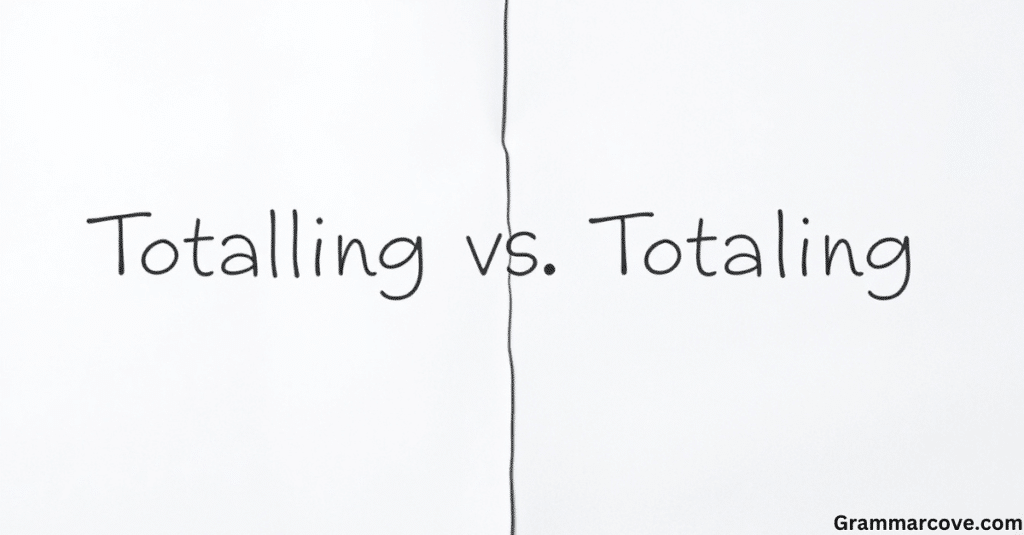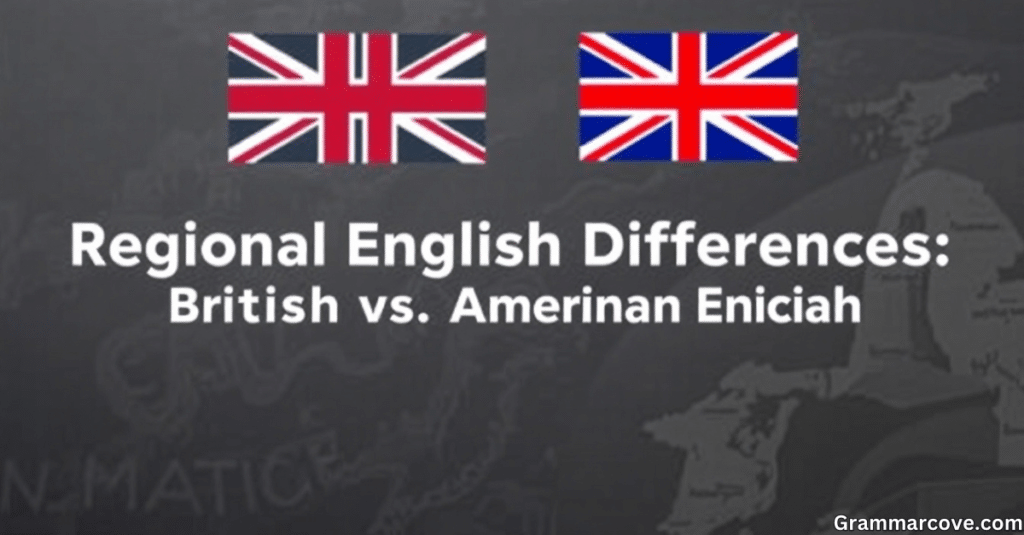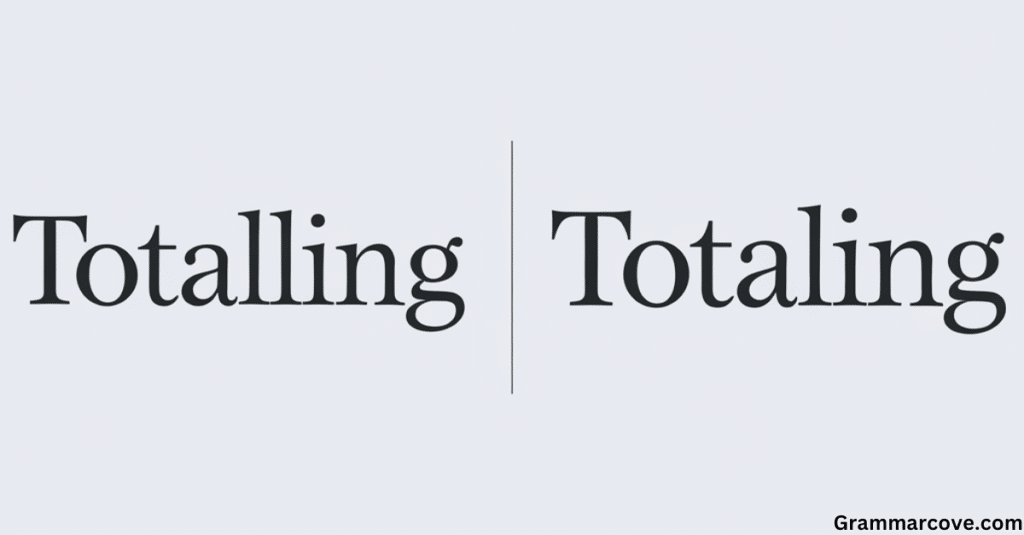English spelling can be a source of confusion for even the most experienced writers, especially when two words sound the same but are spelled differently. One such pair is totalling and totaling. You might find yourself wondering which is the correct choice to use, especially when you’re writing for an international audience.
In this article, we’ll break down the difference between totalling and totaling, dive into the correct spelling of totalling or totaling, and explore how these terms are used in British vs American English. Along the way, we’ll offer real-world examples and explain key spelling rules, providing you with everything you need to know to confidently choose the right spelling.
Totalling vs Totaling: The Key Difference

At first glance, totalling and totaling seem like two versions of the same word. But the reality is that they belong to different English spelling conventions. The correct spelling depends on the regional variety of English you’re using. Here’s the simple rule:
- Totalling (with a double “l”) is the preferred spelling in British English.
- Totaling (with a single “l”) is the preferred spelling in American English.
This distinction might seem trivial, but it’s important to stick to one form consistently, especially in formal or professional writing.
The Correct Spelling of Totalling or Totaling
So, which spelling is correct? The short answer is that both are correct, but only in specific contexts.
If you’re writing for a British audience, you should use totalling. This is the traditional British spelling that aligns with British English spelling conventions. On the other hand, if your audience is primarily based in the United States, you should use totaling as per American English spelling rules.
Example Scenario: Email to a British Client
Imagine you’re sending a project update to a client in the UK. Here’s how you might use totalling:
Subject: Summary of Project Expenses
Dear Sarah,
I’ve attached the detailed breakdown of all expenses related to the project. After totalling the costs, the final total comes to £10,000. Please let me know if you have any further questions or need additional information.
Best regards,
Tom
In this email, using totalling is consistent with British English spelling conventions. It signals that you’re aware of the correct regional spelling rules and helps to maintain professionalism.
Example Scenario: Email to an American Client
Now, let’s consider an email to a client in the United States. In this case, you’d use totaling:
Subject: Project Expenses Breakdown
Hi Emily,
I’ve attached the updated expense report for the project. After totaling the figures, the final total is $10,000. Please review the document and let me know if you need any further clarification.
Best,
David
Here, totaling aligns with American English norms. Just as in the previous example, the meaning remains the same, but the spelling changes according to regional preferences.
Regional English Differences: British vs American English

The difference between totalling and totaling is part of a much larger pattern of British vs American spelling differences. These differences, many of which stem from historical shifts in the English language, continue to influence the way we spell and use words today.
The Influence of Noah Webster
One of the most significant changes in American English was the simplification of spelling introduced by Noah Webster, an American lexicographer and grammarian. His most famous work, the Webster’s Dictionary, standardized many of the spellings we now associate with American English. Webster’s aim was to make spelling simpler and more phonetic, which led to the drop of double consonants in many words. As a result, words like totaling became the norm in the United States, while the British retained the double l in words like totalling.
For example:
- Colour (British) vs Color (American)
- Theatre (British) vs Theater (American)
- Realise (British) vs Realize (American)
- Defence (British) vs Defense (American)
These spelling conventions in English have persisted over the years, so it’s crucial to keep them in mind when writing for a specific region.
Synonyms of Totalling and Totaling
While totalling and totaling are both verbs that refer to adding up or calculating a sum, there are numerous synonyms you can use to convey the same or a similar meaning. These synonyms often appear in accounting, business, or casual conversation when referring to the process of adding up numbers. Some common alternatives include:
- Summing up
- Adding up
- Calculating
- Tallying
- Counting
- Putting together
Example Scenario: Accounting Report
Here’s an example where summing up is used as a synonym for totalling or totaling:
Subject: Sales Report for Q1
Dear Mark,
After summing up all the sales figures, we’ve determined that our revenue for Q1 stands at $500,000. Let me know if you have any questions about this.
Best regards,
Rachel
Here, summing up effectively conveys the same meaning as totalling or totaling, but without directly referencing the spelling question. This is useful in situations where a more neutral or varied vocabulary is needed.
Usage in British vs American English
While the spelling difference between totalling and totaling is the most obvious distinction, there are subtle differences in how these terms are used in British vs American contexts.
British Usage: Totalling in Accounting and Finance
In British English, totalling is used in both informal and formal contexts, especially in accounting, finance, and reporting. For instance, accountants might use totalling when adding up a set of expenses or profits. It’s also common in everyday language when people are discussing simple arithmetic or financial summaries.
Example from an accounting context:
Subject: Annual Budget Report
Dear Linda,
After totalling the department’s expenses for the year, we’ve reached a final figure of £200,000. Please find the detailed breakdown attached.
Kind regards,
James
American Usage: Totaling in Everyday Speech
In American English, totaling serves the same function, but the usage is more widespread in casual speech. Americans tend to favor simpler, more direct phrasing in both written and spoken contexts, which makes totaling the standard choice.
Example from an American business context:
Subject: Q1 Financial Summary
Hey Jason,
After totaling all the figures, we’re looking at a final total of $200,000 for Q1. Let me know if you need anything else.
Best,
Samantha
Again, the context is the same, but the spelling reflects American conventions.
Accounting and Calculating Totals

When it comes to accounting and calculating totals, the term “totalling” or “totaling” is used to describe the process of adding up numbers or calculating a sum. Whether you’re working with receipts, sales figures, or taxes, you’ll be totalling or totaling values to get a final number.
For example, an accountant might use the term to describe adding up multiple invoices or receipts, while a business owner might use it when calculating the total costs for a quarter.
Example Scenario: Accountant’s Report
Subject: Totals for the Year-End Report
Dear Jonathan,
I’ve finished totalling the year-end receipts and expenses. The final report is ready for review, and the totals align with our forecast.
Best,
Olivia
This is a typical use of totalling in a formal accounting context in British English.
Spelling Conventions in English
As we’ve seen, spelling conventions in English are shaped by both historical developments and regional preferences. The use of totalling versus totaling is just one example of how English spelling rules differ across countries. The language simplification movement in the United States, championed by figures like Noah Webster, led to many of the spelling changes we associate with American English today.
The underlying goal of these simplifications was to make English more accessible and logical. However, British English has largely maintained the traditional spellings, which can sometimes seem more complicated to those accustomed to American norms.
British vs American Spelling Differences
Beyond totalling vs totaling, here are some other examples of common British vs American spelling differences:
| British English | American English |
|---|---|
| Totalling | Totaling |
| Colour | Color |
| Theatre | Theater |
| Realise | Realize |
| Defence | Defense |
| Travelling | Traveling |
| Cheque | Check |
The differences in spelling are a result of distinct historical influences on the English language in both regions. While British English tends to preserve older spellings, American English has undergone significant simplifications, often in line with Noah Webster’s reforms.
Conclusion: Totalling or Totaling?
To wrap up, the choice between totalling and totaling boils down to your audience and the region in which you’re writing. Here’s a summary of the key points:
| Key Point | British English | American English |
|---|---|---|
| Preferred Spelling | Totalling | Totaling |
| Regional Preference | UK, Ireland, Australia | United States |
| Common Contexts | Accounting, Reporting | Everyday Speech, Business |
| Example Use in Sentence | After totalling the costs… | After totaling the expenses… |
- Totalling is used in British English.
- Totaling is used in American English.
- Both terms refer to the same process: adding up numbers or calculating a total.
- It’s essential to stick to the correct spelling for your audience to maintain professionalism and clarity in your writing.
By following these spelling conventions and understanding the regional differences, you can confidently choose the right spelling in your writing and avoid any confusion with your readers. Whether you’re totaling up project costs, totalling sales figures, or summing up expenses, the key is to stay consistent and aware of your audience’s expectations.


